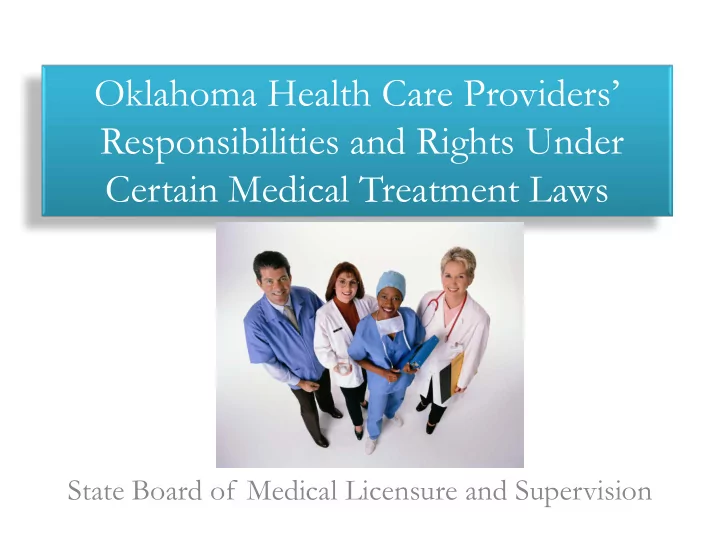

Oklahoma Health Care Providers’ Responsibilities and Rights Under Certain Medical Treatment Laws State Board of Medical Licensure and Supervision
Physicians ensure quality medical care, and also that patient wishes and preferences are honored, no matter the patient’s age, disability, or expected length of life.
What does the Medical Treatment Laws Information Act say? 1. Patients and their families will be given a disclosure statement describing their rights to obtain life-saving medical treatment, food, and fluids under state law, and information about whom to contact to report violations of those rights. 2. Each year, health care providers will need to certify they have reviewed a brochure explaining their rights and responsibilities regarding provision of life-preserving measures, and every two years will take an online continuing education course intended to help providers understand Oklahoma’s protective treatment laws.
Why the need for this Continuing Medical Education? The Oklahoma legislature enacted the Medical Treatment Laws Information Act in order to ensure that those in the health-care community (including medical, nursing, hospital, and nursing-home providers) are aware of Oklahoma’s various laws related to the provision of life-preserving treatment. The legislature’s intent was to protect patients from involuntary denial of life-preserving care caused by a health-care provider’s lack of awareness of Oklahoma’s protective laws, while recognizing patients’ rights to refuse treatments .
This presentation will discuss 5 concepts : 1. What happens when you disagree with a directive by or on behalf of your patient to provide medical treatment? 2. What happens when you disagree with a directive by or on behalf of your patient to withhold or withdraw medical treatment? 3. What does – and does not– violate Oklahoma’s law against assisting suicide? 4. What are the legal requirements regarding cardio- pulmonary resuscitation (CPR & DNR)? 5. What are Oklahoma’s requirements concerning nutrition and hydration for patients?
“Life-preserving health care service”: a health • care service the denial of which, in reasonable First……. medical judgment, will result in or hasten the death of the patient key terms “Incompetent patient”: one who is a minor, has • been declared legally incompetent to make decisions affecting medical treatment or care, or, in the reasonable judgment of the attending physician, is unable to make decisions affecting medical treatment or other health care services “Nutrition”: sustenance administered by way of • the gastrointestinal tract “Person authorized to make health care • decisions for the patient”: - for minors not legally able to consent to health care services, a custodial parent or guardian - for others currently incapable of making their own health care decisions: > guardian with authority to make medical decisions > health care proxy or attorney-in-fact > other person authorized under common law (consult attorney for help in determining)
Reporting of Violations Alleged violations of any of the laws summarized in this presentation should be reported to the licensing entity for the health care entity or individual alleged to be in violation. If the identity of the entity or person alleged to be in violation is unknown, or if the proper licensing entity is unknown, then the allegation should be reported to the Oklahoma State Board of Medical Licensure and Supervision. In addition, suspected violations of the Assisted Suicide Prevention Act should also be reported to the Oklahoma Department of Human Services.
This presentation has been designed to help health-care professionals and institutions be aware of Oklahoma’s protective medical treatment laws.
Recommend
More recommend